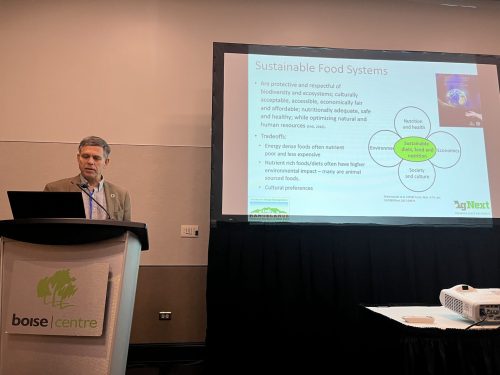When we think about research in sustainable animal agriculture, an important field to consider is emissions management in grazing systems. While research in this space is limited, we know that it is necessary in order to understand production sustainability and efficiency for grazing cattle. Methane (CH4) emissions from the beef supply chain are most heavily concentrated in the cow/calf and grazing sectors (i.e., when an animal is grazing pasture which spans the majority of their life) which is why additional research on this topic is vital. At AgNext, we are eager to advance the science of grazing systems, and this wouldn’t be possible without the expert faculty on our grazing systems team.
From being active on committees to attending conferences to research, AgNext is contributing to the pursuit of knowledge around grazing systems. Dr. John Ritten, an agricultural economist and extension specialist at AgNext, serves on the SRM REM Steering Committee to further advancements in grazing systems research and foster industry connections. This is an excellent way to keep up-to-date and help affect change in the world of sustainable animal agriculture.

In addition to faculty involvement on committees, the AgNext team regularly travels to conferences to present current research and make connections with like-minded individuals. Members of the AgNext team including Dr. Greg Thoma, Dr. Sara Place, Dr. EJ Raynor, Dr. Kevin Jablonski, and Ashley Schilling recently attended the Annual Conference held by the Society for Range Management (SRM). This conference is currently the largest conference in the world surrounding grazing management on rangelands. Both Dr. Place and Dr. Thoma presented at a symposium to discuss the role rangelands play in climate neutrality for beef cattle production. Rangeland management is a vital aspect of sustainability, so our team was thankful for the opportunity to attend and present at the SRM conference as we build academic and industry relationships in this field.
Putting research into practice is a foundational aspect of AgNext’s mission, and our team is currently working on a trial that covers multiple areas of research including grazing systems. As part of a partnership between AgNext, USDA Agricultural Research Service (ARS), and the Crow Valley Livestock Cooperative, graduate student Ines Mesa and Dr. EJ Raynor are leading a research trial to measure how the dormant or winter season environment of yearling stocker steers impacts their greenhouse gas emissions in the summer.
This trial involves three 40-head groups of steers, each being observed in different environments across the High Plains region. One group spent the winter at the local ARDEC facility at Colorado State University and is now being housed at the Eastern Colorado Research Center in Akron, Colorado. Another group’s winter measurements were taken at the U.S. Meat Animal Research Center in Clay Center, Nebraska in a feedlot environment. The third group of steers spent the winter on a private producer’s ranch in Grover, Colorado in association with the Crow Valley Livestock Cooperative. In the summer, each of these groups will be transported to the USDA ARS Central Plains Experimental Range near Nunn, Colorado to graze native rangeland in order to evaluate methane emissions, CO2 emissions, and oxygen consumption.
The goal for these trial results is to help AgNext (in partnership with USDA) gain additional knowledge of how grazing system components such as dormant season environments impact greenhouse gas emissions from beef cattle grazing a common grazing land.
AgNext as a team is optimistic about advancements in sustainable animal agriculture, and we look forward to sharing our progress as we foster partnerships, develop research methods, and utilize revolutionary technology.

Sydney Gradisar
Communications Intern

EJ Raynor, Ph.D.
Research Scientist
